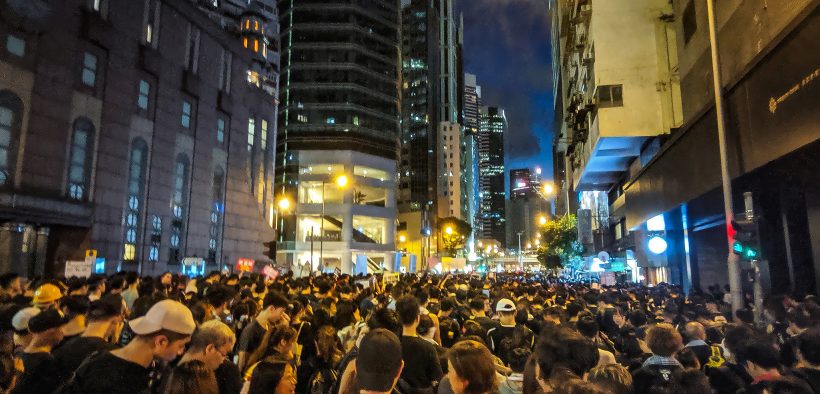Protests Continue In Hong Kong Despite Riot At Government Building

“The movement at large is peaceful, but some young people are overwhelmed by a strong sense of helplessness and they’re emotionally charged.”
“Demonstrations are likely to continue until a controversial extradition bill is completely withdrawn from consideration,” reads a report from Citizen Truth published near the end of last month in reference to the ongoing political uprising in Hong Kong. The ongoing situation has escalated in recent days, with no conclusion in sight due to Hong Kong Chief Executive Carrie Lam’s refusal to pull the extradition bill from future deliberation.
However, recent actions by a small portion of those against the extradition bill may lead to a new, and perhaps more violent chapter of events.
A Riot At State Government Headquarters
“Hundreds of protesters have broken into Hong Kong’s legislature, spraying graffiti on the walls and raising the former colonial flag, which includes the British union jack,” The Guardian reported on July 1st after several dozen protestors broke into government headquarters in Hong Kong.
“They simply wouldn’t listen to me,” said Lam Cheuk-ting, one of the lawmakers who is in favor of the general protests. “The movement at large is peaceful, but some young people are overwhelmed by a strong sense of helplessness and they’re emotionally charged.”
While some of the pro-democracy and anti-extradition lawmakers who attempted to peacefully keep the rioters out of the government building were slightly roughed up by rioters, the vast majority of protestors remained peaceful throughout demonstrations throughout the city. This incident and a currently small group of actors are not representative of the movement at large. The action at the state government headquarters draws a chilling parallel to the diminishing civil rights within Hong Kong over the past decade.
“I am also fully aware that while we have good intentions, we still need to be open and accommodating,” Lam stated on July 1st in reference to the protests. She also stated the situation has helped her understand the importance of understanding public sentiment. Her words have not done anything to relieve the concerns of those concerned about her administration acting as a puppet of the Chinese government, the future of the extradition bill, and the decline of rights in Hong Kong.
Hong Kong Celebrities Blacklisted For Supporting Democracy Movement
Singer Denise Ho first threw her celebrity behind the Hong Kong democracy movement five years ago and continues to do so today.
Was tear gassed again. Retreated from the premises together with the protesters at around midnight, moments after the police came to disperse the crowds.
The kids kept going back, making sure that everyone has left safely, with the motto : “No one left behind!”#Hongkong
— Denise Ho (HOCC) (@hoccgoomusic) July 1, 2019
But for celebrities like Ho and in contrast to the pro-democracy movements of 1989, support for today’s movements comes at a steep cost. As the New York Times explained, today’s stars are much more dependent on mainland China:
“In 2014, Ms. Ho’s career had been taking off in China, and she had played more than 100 concerts there. Then she took part in a protest movement in Hong Kong that called for freer elections in the semiautonomous territory.
“The Chinese government barred her from performing and scrubbed her music from the playlists of streaming websites. The blacklisting cut around $120,000 from her annual income, her manager said…
“In recent years, as nationalist sentiment in the mainland has grown and the economy has rapidly expanded, the authorities, companies and fans have frequently shunned performers who take stances that are seen to be critical of Beijing,” the New York Times wrote.
As a result, many celebrities have decided to not speak out in support of the current democracy movement after witnessing the consequences of supporting the Umbrella Movement’s origins in 2014. The Umbrella Movement was so named in 2014 after protests saw over 100,000 citizens take to the streets and originated from demonstrators using umbrellas to shield themselves from tear gas.
While other celebrities have come out to praise the work of the police such as actor Tony Leung Chui-wai; singer Anthony Wong Yiu-ming has taken a different approach.
“I’ve been singing for 30 years and I can afford to pay this price. A lot of people would then become too scared to speak up or express themselves. This is the most chilling part of it,” he stated when speaking to the New York Times during a phone interview.
He also told the outlet that he felt that he was a “citizen first” and felt moved to speak out despite losing more than half of his annual income from mainland China, including international partnerships.















